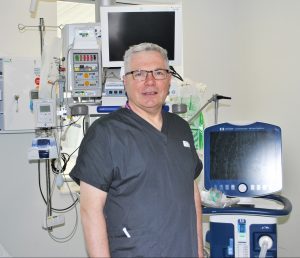A global outlook: Humanitarian insight within COVID-19 clinical research
As with many academics Professor Paul Dark wears a number of different hats including clinician and humanitarian. It’s through these combined disciplines that he is often looking at the wider impact his research can have.
Greater Manchester’s response to COVID-19
 In his role as NIHR National Research Lead for Critical Care and consultant at Salford Royal NHS Foundation Trust, Paul is one of a number of national research leads advising the Department of Health and Social Care on Urgent Public Health research into vaccines, treatments and diagnostic tests. He is also playing a key role in Greater Manchester accelerated clinical studies into the treatment and care of COVID-19 patients.
In his role as NIHR National Research Lead for Critical Care and consultant at Salford Royal NHS Foundation Trust, Paul is one of a number of national research leads advising the Department of Health and Social Care on Urgent Public Health research into vaccines, treatments and diagnostic tests. He is also playing a key role in Greater Manchester accelerated clinical studies into the treatment and care of COVID-19 patients.
This has seen Paul and national colleagues set up a series of observational, treatment and medical evaluation studies in a matter of weeks to help the global response against the virus. An example of this is the newly launched RECOVERY-RS Respiratory Support study, led by the University of Warwick, which Paul is national co-investigator for.
The study sets out to compare three different treatments that can help a patient with their breathing. The aim is to identify which methods are best at keeping oxygen levels adequate and help prevent the need for mechanical ventilation, where a patient’s breathing is controlled via a machine. This in part may help reduce the high demand for ventilators and the high levels of clinical expertise and oversight needed.
The importance of a global approach
Paul explains:
“As part of my role as Research Professor at the Humanitarian and Conflict Response Institute, I’ve been heavily involved in interdisciplinary collaboration and how we can translate acute care research in low income settings.
“Up until now, the areas most affected by COVID-19 have been high-income countries with relatively stable economies such as China, UK, USA, Italy and France. Quite rightly governments have focused on sourcing additional resource, developing potential vaccines, re-purposing potential drug treatments and expanded equipment such as ventilators to help treat the pandemic. But what will happen in countries where this simply isn’t available?”
As the global impact of the COVID-19 pandemic widens, Paul knows that research in the UK could help informs others, specifically developing countries such as those in sub-Saharan Africa. Studies like RECOVERY-RS could have the potential to identify successful treatment methods which do not require large amounts of equipment and funding.
Looking forward
Summing up, Paul added:
“Going forward, it’s important that we continue to openly share findings, study protocols and insight with colleagues globally, including humanitarian organisations such as Médecins Sans Frontières and the Red Cross. The more information we have, the better we can adapt treatment protocols to the setting and resource available.”


0 Comments